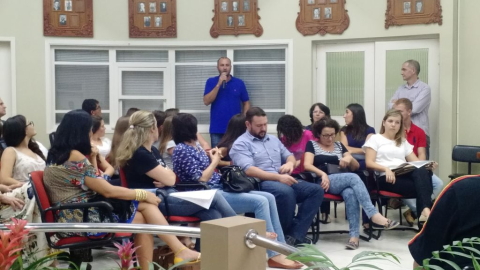
Apr 20, 2016 | Focolare Worldwide
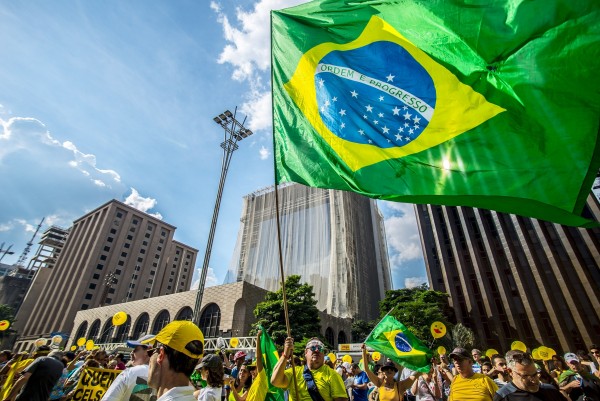 With 367 ayes and 137 nays, the Brazilian deputies approved the opening of the impeachment procedure against President Dilma Rousseff, while other 200 million greatly divided Brazilians, anxiously awaited the outcome of the voting session. It is now the Senate’s turn to confirm or not the implementation the indictment of the President. Should it be favourable, the vote of 11 May will suspend the President from her mandate for 6 months, while awaiting for the final verdict. The Brazilian constitution provides, in this case and for this length of time, that the Vice-President will assume the office. The Brazilian bishops in an official declaration dated 13 April, aired their opinions “in the face of the profound ethical, political, economic and institutional crisis” which is besetting the country with “unprecedented scandals of corruption,” involving businessmen, politicians, public officers in scheme which, besides being immoral and criminal, will be paid dearly”– the bishops said – especially by the poor. On focusing attention on the impeachment, they affirmed that they were “closely following this procedure” in the hope that everything would be done “in compliance with judicial system of the democratic rule of law. They furthermore underlined that “the good of the Nation demands that all parties overcome their personal interest, that of parties and groups” so that “the polarisation of ideological positions in a highly emotive atmosphere, would lead to the loss of the objectives and bring division and violence that menace social peace.” They asked the “Brazilian people to preserve the values of democratic co-existence, respect of one another, tolerance and healthy pluralism, and promote a peaceful political debate.” They concluded by affirming their belief “in dialogue, in the wisdom of the Brazilian people and the discernment of the authorities in seeking the strategies that can guarantee the solution to the actual crisis and the preservation of peace in our country.”
With 367 ayes and 137 nays, the Brazilian deputies approved the opening of the impeachment procedure against President Dilma Rousseff, while other 200 million greatly divided Brazilians, anxiously awaited the outcome of the voting session. It is now the Senate’s turn to confirm or not the implementation the indictment of the President. Should it be favourable, the vote of 11 May will suspend the President from her mandate for 6 months, while awaiting for the final verdict. The Brazilian constitution provides, in this case and for this length of time, that the Vice-President will assume the office. The Brazilian bishops in an official declaration dated 13 April, aired their opinions “in the face of the profound ethical, political, economic and institutional crisis” which is besetting the country with “unprecedented scandals of corruption,” involving businessmen, politicians, public officers in scheme which, besides being immoral and criminal, will be paid dearly”– the bishops said – especially by the poor. On focusing attention on the impeachment, they affirmed that they were “closely following this procedure” in the hope that everything would be done “in compliance with judicial system of the democratic rule of law. They furthermore underlined that “the good of the Nation demands that all parties overcome their personal interest, that of parties and groups” so that “the polarisation of ideological positions in a highly emotive atmosphere, would lead to the loss of the objectives and bring division and violence that menace social peace.” They asked the “Brazilian people to preserve the values of democratic co-existence, respect of one another, tolerance and healthy pluralism, and promote a peaceful political debate.” They concluded by affirming their belief “in dialogue, in the wisdom of the Brazilian people and the discernment of the authorities in seeking the strategies that can guarantee the solution to the actual crisis and the preservation of peace in our country.”  The Political Movement for the unity of Brazil (MPPU) – association for political confrontation which draws inspiration from the ideals of fraternity typical of the spirituality of the Focolare – affirmed through its President, Sergio Previdi “its conviction in the force of dialogue that is free from prejudices.” Previdi moreover invited the citizens to “call up inclusive dialogue” because “in exercising democracy together we can put into practice the necessary actions for the good of all.” “A lot can still be done – they said – if we put into practice the culture of fraternity, overcoming party politics positively in the daily political life of the country.” For the MMPU of Brazil the main concern in this delicate moment is that of not “scattering our forces and allowing ideological and party differences to divide us,” but of “acknowledging our differences so as to deepen dialogue.” And above all “making the effort to gather information from various sources, in order to get closer to the truth.” The numerous members of the Focolare Movement in Brazil, in line with the Brazilian Episcopal Conference, undertakes to offer what they consider “the main contribution we can give in this difficult moment: the declaration and testimony of fraternity lived – the core of the spirituality of unity that inspires us all. ”
The Political Movement for the unity of Brazil (MPPU) – association for political confrontation which draws inspiration from the ideals of fraternity typical of the spirituality of the Focolare – affirmed through its President, Sergio Previdi “its conviction in the force of dialogue that is free from prejudices.” Previdi moreover invited the citizens to “call up inclusive dialogue” because “in exercising democracy together we can put into practice the necessary actions for the good of all.” “A lot can still be done – they said – if we put into practice the culture of fraternity, overcoming party politics positively in the daily political life of the country.” For the MMPU of Brazil the main concern in this delicate moment is that of not “scattering our forces and allowing ideological and party differences to divide us,” but of “acknowledging our differences so as to deepen dialogue.” And above all “making the effort to gather information from various sources, in order to get closer to the truth.” The numerous members of the Focolare Movement in Brazil, in line with the Brazilian Episcopal Conference, undertakes to offer what they consider “the main contribution we can give in this difficult moment: the declaration and testimony of fraternity lived – the core of the spirituality of unity that inspires us all. ”
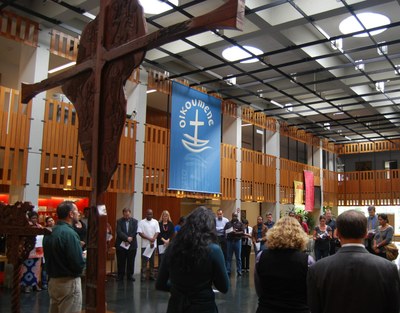
Apr 19, 2016 | Non categorizzato
 Without falling into the trap of ideological self-contained reminiscences, we shall be asking what has contributed to the idea of a “European identity”, whether it be conceived as an existing identity or as one still coming into existence, in what terms it can be described, and what has given rise to the ideal of European unity that can then be expressed in political form. Moving one step further, we shall attempt to draw, out of the historical experience of Europe, values and ideals that could enable us to surmount the present crisis and find a way forward into the future. Are there any examples and actual projects that are putting into action these values and ideals? Within a broad-minded vision of secularism, what could be a welcome contribution from churches and other religious communities? And, in this context, what is, or could be, the role of Switzerland?
Without falling into the trap of ideological self-contained reminiscences, we shall be asking what has contributed to the idea of a “European identity”, whether it be conceived as an existing identity or as one still coming into existence, in what terms it can be described, and what has given rise to the ideal of European unity that can then be expressed in political form. Moving one step further, we shall attempt to draw, out of the historical experience of Europe, values and ideals that could enable us to surmount the present crisis and find a way forward into the future. Are there any examples and actual projects that are putting into action these values and ideals? Within a broad-minded vision of secularism, what could be a welcome contribution from churches and other religious communities? And, in this context, what is, or could be, the role of Switzerland?
Programme
A panel discussion, with audience participation, with:
- Rev. Dr Olav Fykse Tveit, general secretary of the World Council of Churches
- Mr Eric Ackermann, a member of the Jewish community in Geneva
- Ms Gaelle Courtens, a journalist associated with the Federation of Protestant Churches in Italy and the ‘nev-notizie evangeliche’ Press Agency
- Mr Pasquale Ferrara, a diplomat, and professor at the LUISS University, Rome, and the Sophia University Institute, Loppiano
- Mr Andreas Gross, a former Swiss parliamentarian, and a former member of the Parliamentary Assembly of the Council of Europe
- In the chair: Ms Marguerite Contat, former head of delegations at the International Committee of the Red Cross, and joint president of the Genevan Constituent Assembly, 2008-12
Simultaneous interpretation in English and French will be available. The event will be live streamed online.
Apr 19, 2016 | Focolare Worldwide
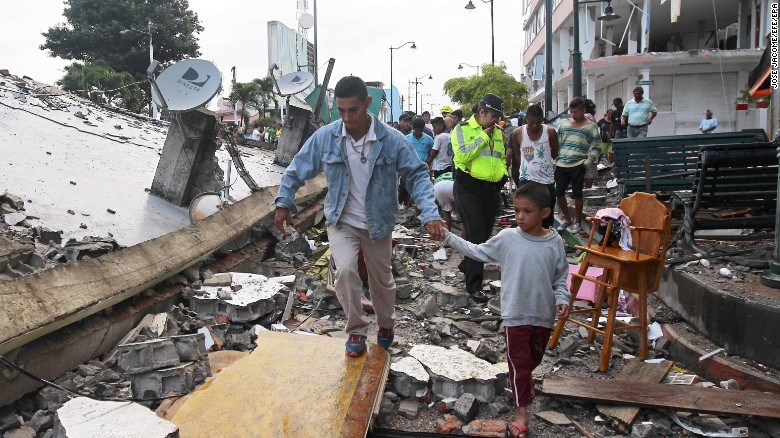
Apr 18, 2016 | Focolare Worldwide
 “Our country’s coastal region was hit by a severe earthquake with a magnitude of 7.8 on the Richter scale. It was felt throughout Ecuador, and also in several regions of Colombia and northern Peru,” write Fabian and Ardita from the Focolare community in Quito. “The situation is critical especially in several devastated cities.” “The solidarity of the people was prompt and concrete: people risking their own lives to help others; testimonies of the many people who lost loved ones; but in the midst of all the suffering there is also the strong-felt faith of the people. It’s quite moving and inspires us to believe in His love.” In response to the emergency in Ecuador the Focolare Movement has launched a fundraiser while a study is underway to see what can be done locally on the ground. News has also arrived from Focolare communities in Nagasaki and Tokyo (Japan): “For two days the country has been immersed in an atmosphere of ‘suspense’ because of the earthquake on Kyushu Island, in the regions of Kumamoto and Oita. The situation has activated an immediate solidarity effort and prayer in both religious and civil sectors.” Local authorities have already made arrangements to welcome the nearly 184,000 displaced persons. How you can help: Donations sent to the accounts below will be managed jointly by the Associations Action for a United World (AMU) and Action for New Families (AFN). In many countries of the European Union and in other countries of the world tax benefits are available for making such donations according to local regulations. How you can help: CAUSE: Ecuador Earthquake Emergency
“Our country’s coastal region was hit by a severe earthquake with a magnitude of 7.8 on the Richter scale. It was felt throughout Ecuador, and also in several regions of Colombia and northern Peru,” write Fabian and Ardita from the Focolare community in Quito. “The situation is critical especially in several devastated cities.” “The solidarity of the people was prompt and concrete: people risking their own lives to help others; testimonies of the many people who lost loved ones; but in the midst of all the suffering there is also the strong-felt faith of the people. It’s quite moving and inspires us to believe in His love.” In response to the emergency in Ecuador the Focolare Movement has launched a fundraiser while a study is underway to see what can be done locally on the ground. News has also arrived from Focolare communities in Nagasaki and Tokyo (Japan): “For two days the country has been immersed in an atmosphere of ‘suspense’ because of the earthquake on Kyushu Island, in the regions of Kumamoto and Oita. The situation has activated an immediate solidarity effort and prayer in both religious and civil sectors.” Local authorities have already made arrangements to welcome the nearly 184,000 displaced persons. How you can help: Donations sent to the accounts below will be managed jointly by the Associations Action for a United World (AMU) and Action for New Families (AFN). In many countries of the European Union and in other countries of the world tax benefits are available for making such donations according to local regulations. How you can help: CAUSE: Ecuador Earthquake Emergency
| Azione per un Mondo Unito ONLUS (AMU) |
Azione per Famiglie Nuove ONLUS (AFN) |
| IBAN: IT16 G050 1803 2000 0000 0120 434 at Banca Popolare Etica |
IBAN: IT55 K033 5901 6001 0000 0001 060 at Banca Prossima |
| SWIFT CODE/BIC: CCRTIT2184D |
SWIFT CODE/BIC: BCITITMX |

Apr 18, 2016 | Non categorizzato

Tommaso Sorgi (left) with Igino Giordani in 1969
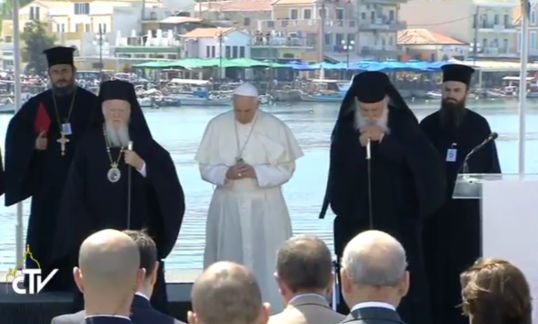
Apr 17, 2016 | Focolare Worldwide
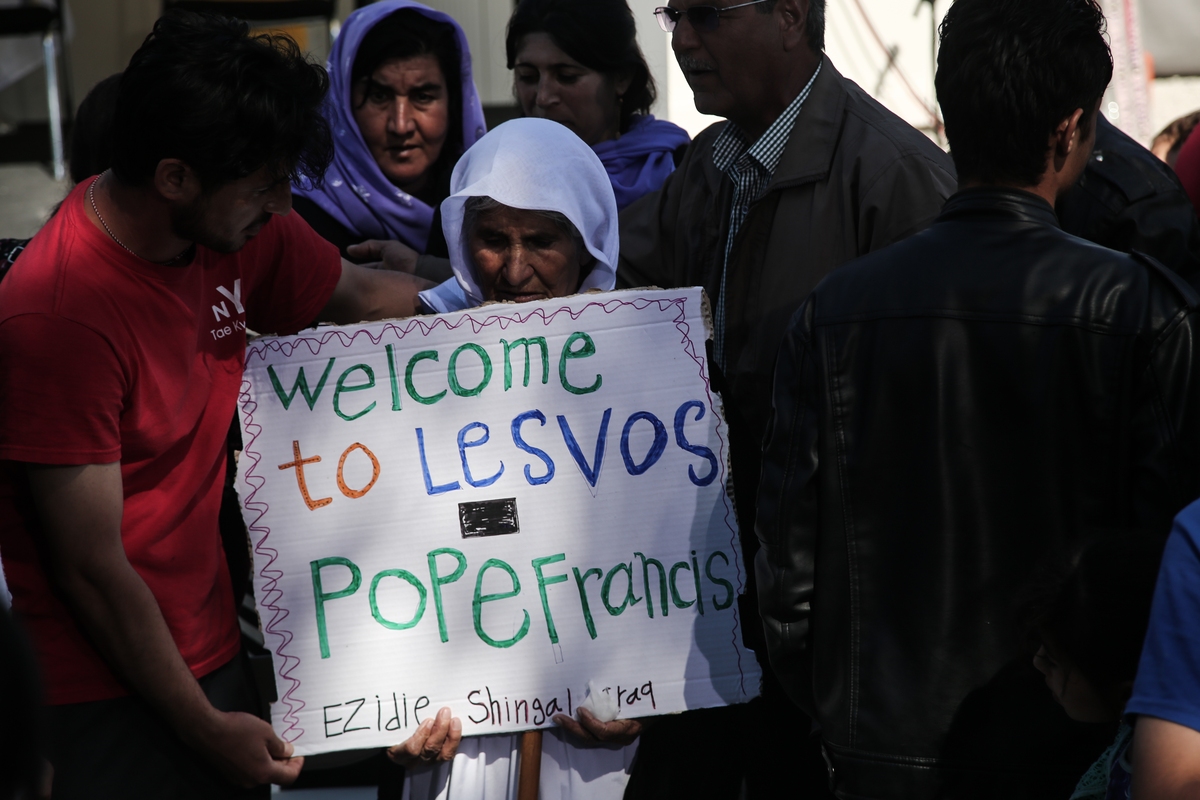
Pope Francis visits the Refugee Camp of Moria, in Mytilene, Lesbos, on April 16, 2016
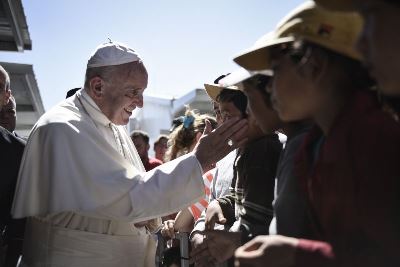 There was nothing but gratitude for the Greek people, expressed in different ways by the three religious leaders: In a moment of great difficulty caused by the serious economic crisis, the people still find the way and the heart to embrace those who flee to a better future. They expressed equal gratitude towards the many volunteers who showed up from all parts of Europe and around the world. Originally from South Africa, Pauline, from the Focolare Movement, has been living for many years between Athens and Lesbo. She repeatedly witnessed the landings of the refugees and helped to rescue them: “The Pope has also sent a political message at the border openings. I wonder why he didn’t go to Idomeni. Perhaps it would have been too political.” Chiara, from Pope John XXIII Association: “He said what I’ve felt for some time: Just stop classifying these people as ‘refugees’, as numbers. It’s time for personal contact, for knowing their stories, their backgrounds;” Eugenio, from the Italian Ambulance Corps at the Order of Malta, said: “I was very moved when he spoke of the children that die on the sea, because I have seen such scenes myself. I managed to shake hands with him and was strengthened for my work.” Cristina is Catholic and her grandparents are refugees that fled from Turkey to Lesvos: “It was an historic event, unimagineable on this island. It seems like a dream”. Father Maurice is coordinator of the Jesuit Refugee Service (JRS) in Greece. He remarked: “All of it was important: the words, the gestures, the silences. All of it spoke. The most powerful moment in the ‘jail’ was the personal contact the Pope had with each person” “A common message was sent to the refugees,” the Jesuit went on to say. They are mainly Muslims discovering a land of Christian origins. Therefore it matters that they see the unity of the Christian leaders and the closeness that these leaders wish to give a witness of.” “Moving. And very important from the ecumenical and political point of view, because of the meeting with Prime Minister, Alexis Tsipras,” said Vasileios Meichanetsidis from Apostles (an NGO from the Greek Orthodox Church). “The Pope recognised how much the Greeks had done, and the Greeks gladly welcomed him.”
There was nothing but gratitude for the Greek people, expressed in different ways by the three religious leaders: In a moment of great difficulty caused by the serious economic crisis, the people still find the way and the heart to embrace those who flee to a better future. They expressed equal gratitude towards the many volunteers who showed up from all parts of Europe and around the world. Originally from South Africa, Pauline, from the Focolare Movement, has been living for many years between Athens and Lesbo. She repeatedly witnessed the landings of the refugees and helped to rescue them: “The Pope has also sent a political message at the border openings. I wonder why he didn’t go to Idomeni. Perhaps it would have been too political.” Chiara, from Pope John XXIII Association: “He said what I’ve felt for some time: Just stop classifying these people as ‘refugees’, as numbers. It’s time for personal contact, for knowing their stories, their backgrounds;” Eugenio, from the Italian Ambulance Corps at the Order of Malta, said: “I was very moved when he spoke of the children that die on the sea, because I have seen such scenes myself. I managed to shake hands with him and was strengthened for my work.” Cristina is Catholic and her grandparents are refugees that fled from Turkey to Lesvos: “It was an historic event, unimagineable on this island. It seems like a dream”. Father Maurice is coordinator of the Jesuit Refugee Service (JRS) in Greece. He remarked: “All of it was important: the words, the gestures, the silences. All of it spoke. The most powerful moment in the ‘jail’ was the personal contact the Pope had with each person” “A common message was sent to the refugees,” the Jesuit went on to say. They are mainly Muslims discovering a land of Christian origins. Therefore it matters that they see the unity of the Christian leaders and the closeness that these leaders wish to give a witness of.” “Moving. And very important from the ecumenical and political point of view, because of the meeting with Prime Minister, Alexis Tsipras,” said Vasileios Meichanetsidis from Apostles (an NGO from the Greek Orthodox Church). “The Pope recognised how much the Greeks had done, and the Greeks gladly welcomed him.”  “We’re all migrants,” the Pope went on to say during the prayer at the port of Lesbo where, as at Lampedusa in 2013, he left a wreath of flowers on the surface of the sea. What is being expected of the political world? “It would be a matter of further stronger appeals especially toward Europe to consider the matter of the migrants and of the refugees not only in terms of internal politics or emergency, but as a new front on which the future of the continent comes into play along with its credibility in terms of its claims of principles and concrete politics,” said pasquale Ferrara, author of the recent book, Il mondo di Francesco. Bergoglio e la politica internazionale. Ferrara is a member of the Abba School for the field of political science and was the Italian Consul to Athens. “The Pope didn’t go there on a humanitarian mission, but wished to underscore this profound dimension,” Ferrara continued. “And the fact that he did it in an ecumenical manner was an even more powerful sign; almost like saying the politics isn’t managing to solve this issue, so we join the game, not as substitutes, but to underscore that this must be a point of priority on the world’s political agenda. The fact that the refugees brought to the Vatican were all Muslims underscores that ISIS is not only exterminating Christians. It is not a problem of religion, but of ending a war, all wars.” Joint Statement Maria Chiara De Lorenzo
“We’re all migrants,” the Pope went on to say during the prayer at the port of Lesbo where, as at Lampedusa in 2013, he left a wreath of flowers on the surface of the sea. What is being expected of the political world? “It would be a matter of further stronger appeals especially toward Europe to consider the matter of the migrants and of the refugees not only in terms of internal politics or emergency, but as a new front on which the future of the continent comes into play along with its credibility in terms of its claims of principles and concrete politics,” said pasquale Ferrara, author of the recent book, Il mondo di Francesco. Bergoglio e la politica internazionale. Ferrara is a member of the Abba School for the field of political science and was the Italian Consul to Athens. “The Pope didn’t go there on a humanitarian mission, but wished to underscore this profound dimension,” Ferrara continued. “And the fact that he did it in an ecumenical manner was an even more powerful sign; almost like saying the politics isn’t managing to solve this issue, so we join the game, not as substitutes, but to underscore that this must be a point of priority on the world’s political agenda. The fact that the refugees brought to the Vatican were all Muslims underscores that ISIS is not only exterminating Christians. It is not a problem of religion, but of ending a war, all wars.” Joint Statement Maria Chiara De Lorenzo
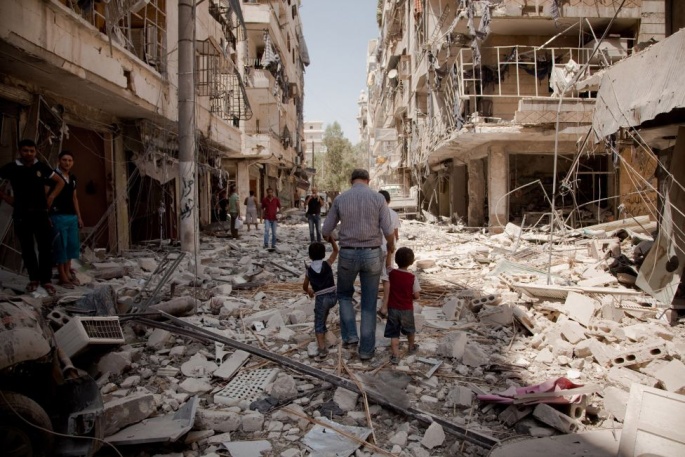
Apr 16, 2016 | Non categorizzato
 “When the conflict in Syria began, seeing that the future didn’t promise anything good, I thought it would be more prudent to leave the country. This idea was strengthened by a job offer in Lebanon. So I secured tickets and began to ready my family for the journey. But many doubts began to crop up inside me. Was it right to go and seek a better future for the family, or was it be better to remain in the country that I loved, to help my people? Talking it over with my wife, I realized that she was more inclined to stay, but she left it up to me. The only thing that mattered to her was that we keep the family together. I felt confused and upset until, one day – I was at church – I clearly felt that our place was here in Aleppo sharing the fate of our people. We are a diverse population made of many ethnic groups, different religions and confessions, but we’ve always lived together in harmony. We’re generous enough to accommodate Palestinians, Lebanese and Iraqis in recent decades, despite the embargo, offering them equal rights and job opportunities. We decided to stay. I worked on my own and earned good money. But after the bloody events that began to devastate the country, my shop was robbed and then destroyed. Nevertheless, there have still been many occasions give assistance through the Centre for the Deaf which my wife and I started to take care of. Later we also began collaboration with other humanitarian organisations to provide – with the help of Providence that has always reached out to us with miraculous assistance – basic necessities to more than 1,500 families. In these five years of war, due to the random bombings in our neighbourhoods, we saw so many families lose their loved ones and so many people left permanently disabled. One day, the driver at the Centre for the Deaf lost his wife and daughter when they were hit by mortar while walking down the street with the family. He was also seriously injured and taken to hospital in a state of shock. I was able to talk about his serious situation with a priest and when the bishop heard of it, he offered to take charge of the funeral for his wife and daughter. For my part, I began to look for money to pay for the Dad’s surgery. Seeing so many people taking an interest him the hospital lowered the costs and some doctors refused to accept payment for their service. So, not only were we able to cover all the expenses, but we had enough money left over to pay for the follow-up treatments that the driver would need. Another time I received a telephone call from a Muslim who works in the church we attend. He was asking me to help him find a house he could live in. He had seen armed rebels entering his district and was worried about his three daughters. After many attempts we finally managed to find a home for them. Once he moved into the new house, he realised he needed a gas cylinder, but could not find one. Then he called me: ‘I ask for this help from you,’ he remarked, ‘because you’re my brother, aren’t you?’ And I answered: “Of course, we are brothers.” Since the recent ceasefire we have experienced a period of apparent calm, although you hear rumblings from time to time that keep us awake at night. Regarding my activities, it’s impossible to even think about beginning them again until the weapons are silenced. The Focolare community is there to support us in the midst of our dangerous situation, along with God’s love that never abandons us. In front of every problem we never feel alone. We continue to experience peace in giving to others, a peace that remains a challenge because it is a gift that must be reconquered each day.”
“When the conflict in Syria began, seeing that the future didn’t promise anything good, I thought it would be more prudent to leave the country. This idea was strengthened by a job offer in Lebanon. So I secured tickets and began to ready my family for the journey. But many doubts began to crop up inside me. Was it right to go and seek a better future for the family, or was it be better to remain in the country that I loved, to help my people? Talking it over with my wife, I realized that she was more inclined to stay, but she left it up to me. The only thing that mattered to her was that we keep the family together. I felt confused and upset until, one day – I was at church – I clearly felt that our place was here in Aleppo sharing the fate of our people. We are a diverse population made of many ethnic groups, different religions and confessions, but we’ve always lived together in harmony. We’re generous enough to accommodate Palestinians, Lebanese and Iraqis in recent decades, despite the embargo, offering them equal rights and job opportunities. We decided to stay. I worked on my own and earned good money. But after the bloody events that began to devastate the country, my shop was robbed and then destroyed. Nevertheless, there have still been many occasions give assistance through the Centre for the Deaf which my wife and I started to take care of. Later we also began collaboration with other humanitarian organisations to provide – with the help of Providence that has always reached out to us with miraculous assistance – basic necessities to more than 1,500 families. In these five years of war, due to the random bombings in our neighbourhoods, we saw so many families lose their loved ones and so many people left permanently disabled. One day, the driver at the Centre for the Deaf lost his wife and daughter when they were hit by mortar while walking down the street with the family. He was also seriously injured and taken to hospital in a state of shock. I was able to talk about his serious situation with a priest and when the bishop heard of it, he offered to take charge of the funeral for his wife and daughter. For my part, I began to look for money to pay for the Dad’s surgery. Seeing so many people taking an interest him the hospital lowered the costs and some doctors refused to accept payment for their service. So, not only were we able to cover all the expenses, but we had enough money left over to pay for the follow-up treatments that the driver would need. Another time I received a telephone call from a Muslim who works in the church we attend. He was asking me to help him find a house he could live in. He had seen armed rebels entering his district and was worried about his three daughters. After many attempts we finally managed to find a home for them. Once he moved into the new house, he realised he needed a gas cylinder, but could not find one. Then he called me: ‘I ask for this help from you,’ he remarked, ‘because you’re my brother, aren’t you?’ And I answered: “Of course, we are brothers.” Since the recent ceasefire we have experienced a period of apparent calm, although you hear rumblings from time to time that keep us awake at night. Regarding my activities, it’s impossible to even think about beginning them again until the weapons are silenced. The Focolare community is there to support us in the midst of our dangerous situation, along with God’s love that never abandons us. In front of every problem we never feel alone. We continue to experience peace in giving to others, a peace that remains a challenge because it is a gift that must be reconquered each day.”
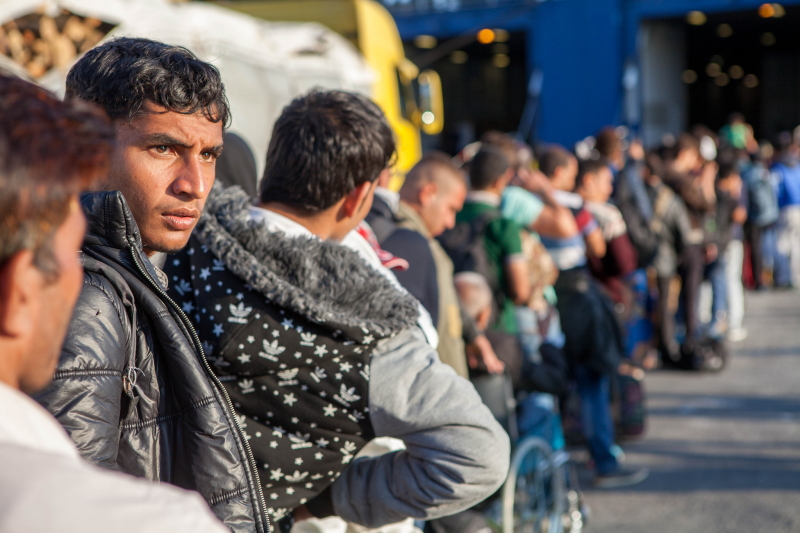
Apr 15, 2016 | Focolare Worldwide

Photo: CAFOD Photo Library

Apr 14, 2016 | Non categorizzato
 After the two Synods on the family, Amoris Laetitia finally announces the ideas of the Pope, this Pope. He is the Pope of mercy, who gathers the approval of those who declare to have “closed” their relations with the Church, or who do not profess any faith. The recent exhortation, set out in over 100 pages, really responds to the expectations of those who hoped in change – very evident on the pastoral level. The doctrinal one has remained unchanged – also for those most bound to tradition. It is a reaching out to all, also to those who find themselves in a so-called “irregular” position. For Pope Francis “no family is a perfect reality and packaged once and for always, but requires a gradual growth of its own capacity to love” (AL 325), as if it aims to remove the tendency to distinguish between ”regulars” and “irregulars” and wants to underline that nobody is condemned and excluded beyond repair. The most significant opening of Amoris Laetitia is certainly intended for the divorced who have remarried, which provides a path of growth in the capacity for discernment, accompanied by pastors or as also cited, by “lay persons who live in the service of the Lord” (AL 312) aware that they are called to “form consciences, and not replace them” (AL 37). It is a path which in certain cases, as stated in the 351st note of the exhortation, could lead also to access to the sacraments, since, the Pope underpins that the Eucharist “is not an award for the perfect, but a generous balm and a nutriment for the weak.” But if the media’s attention is caught precisely by these ‘openings’ to the remarried, it is 4 and 5 (on the beauty of the family that draws inspiration from the Trinitarian design and nurtures on that charity St. Paul spoke about in Cor 1,13) that its merit goes beyond. The centrality of the life of the couples is presented here as never before: “It is the direct encounter face to face with a “thou” who reflects God’s love and is man’s best possession, or as the spouse of the Canticle of Canticles exclaims in a stupendous profession of love in reciprocity: ‘My beloved is mine and I am his. I am my beloved’s and my beloved is mine.” (AL 12-13). «…we often present marriage in such a way that its unitive meaning, call to grow in love and ideal of mutual assistance are overshadowed by an almost exclusive insistence on the duty of procreation.» (AL 36). We need a healthy dose of self-criticism, in our attempt to valorize the eros imbued in creatures, showing marriage in its concrete reality as a “mixture of joys and struggles, tensions and repose, suffering and liberations, satisfactions and longings, and annoyances and pleasures. » (Al 126). Every moment of daily life is highlighted, overcoming the contrast between sacred and profane, and between solemn and unimportant events, since nothing is secondary in the eyes of love and faith. The Pope also takes into account the longer life spans and the initial decision of the spouses that has to be daily renewed» (AL 163), in a continual regeneration and change as each progresses along the path of personal growth and development: «There is no guarantee that we will feel the same way all through life. Yet if a couple can come up with a shared and lasting project, they can love one another and live as one until death do them part, enjoying an enriching intimacy.» (AL 163). Thank you Pope Francis! We really needed the loving care of the Church which continues to present to spouses the high ideal and model of the Trinitarian harmony which has never been reached, and also for the fraternal hand of the Church which stands by all of us, without rejecting anyone.
After the two Synods on the family, Amoris Laetitia finally announces the ideas of the Pope, this Pope. He is the Pope of mercy, who gathers the approval of those who declare to have “closed” their relations with the Church, or who do not profess any faith. The recent exhortation, set out in over 100 pages, really responds to the expectations of those who hoped in change – very evident on the pastoral level. The doctrinal one has remained unchanged – also for those most bound to tradition. It is a reaching out to all, also to those who find themselves in a so-called “irregular” position. For Pope Francis “no family is a perfect reality and packaged once and for always, but requires a gradual growth of its own capacity to love” (AL 325), as if it aims to remove the tendency to distinguish between ”regulars” and “irregulars” and wants to underline that nobody is condemned and excluded beyond repair. The most significant opening of Amoris Laetitia is certainly intended for the divorced who have remarried, which provides a path of growth in the capacity for discernment, accompanied by pastors or as also cited, by “lay persons who live in the service of the Lord” (AL 312) aware that they are called to “form consciences, and not replace them” (AL 37). It is a path which in certain cases, as stated in the 351st note of the exhortation, could lead also to access to the sacraments, since, the Pope underpins that the Eucharist “is not an award for the perfect, but a generous balm and a nutriment for the weak.” But if the media’s attention is caught precisely by these ‘openings’ to the remarried, it is 4 and 5 (on the beauty of the family that draws inspiration from the Trinitarian design and nurtures on that charity St. Paul spoke about in Cor 1,13) that its merit goes beyond. The centrality of the life of the couples is presented here as never before: “It is the direct encounter face to face with a “thou” who reflects God’s love and is man’s best possession, or as the spouse of the Canticle of Canticles exclaims in a stupendous profession of love in reciprocity: ‘My beloved is mine and I am his. I am my beloved’s and my beloved is mine.” (AL 12-13). «…we often present marriage in such a way that its unitive meaning, call to grow in love and ideal of mutual assistance are overshadowed by an almost exclusive insistence on the duty of procreation.» (AL 36). We need a healthy dose of self-criticism, in our attempt to valorize the eros imbued in creatures, showing marriage in its concrete reality as a “mixture of joys and struggles, tensions and repose, suffering and liberations, satisfactions and longings, and annoyances and pleasures. » (Al 126). Every moment of daily life is highlighted, overcoming the contrast between sacred and profane, and between solemn and unimportant events, since nothing is secondary in the eyes of love and faith. The Pope also takes into account the longer life spans and the initial decision of the spouses that has to be daily renewed» (AL 163), in a continual regeneration and change as each progresses along the path of personal growth and development: «There is no guarantee that we will feel the same way all through life. Yet if a couple can come up with a shared and lasting project, they can love one another and live as one until death do them part, enjoying an enriching intimacy.» (AL 163). Thank you Pope Francis! We really needed the loving care of the Church which continues to present to spouses the high ideal and model of the Trinitarian harmony which has never been reached, and also for the fraternal hand of the Church which stands by all of us, without rejecting anyone.
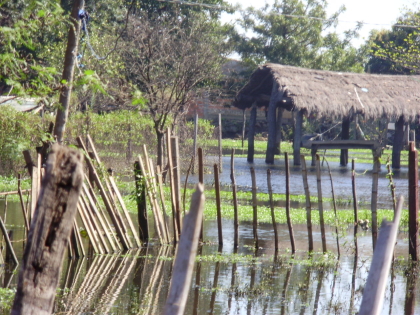
Apr 13, 2016 | Focolare Worldwide, Senza categoria
 “Scholars estimate that from 3000 BC, populations from the Southeast Asian continent arrived here. Among them were also the Guaranì people, composed of many ethnic groups that through the centuries spread to the Caribbean up to the southernmost tip of the continent,” explained Diana Durán, a Paraguayan sociologist and scholar of the aborigines of America. The meeting with a small community of the Avà Guaranì and Mbya ethnic groups came about two years ago, when a big flood of the Paraguay river forced the indigenous group of 33 families (115 members) to abandon the unsteady settlement on the banks of the river where they used to live by gathering wastes from the dumpsite nearby. “At the start we tried to help them with clothing, food, medicine, and healthcare, like the hospitalisation of a diabetic patient, intervening with one of them who had gunshot wounds, renting mobile toilettes when they were sent away to a desert area, or when, after a storm we collected tents and drinking water… and yet we saw that these actions were still insufficient. They needed a piece of land, that could give them shelter and security.“ After a long search, a suitable lot was found: 5.5 hectares at 4.5 km from the city of Ita, with a school and medical dispensary close by. All was surrounded by greens and above all, with the possibility to cultivate a community orchard for their self-support and the space to build a facility for educational courses. The challenge now is to find the finances to buy the land. “We knocked on many doors – Diana recounts. A qualified person helped us to obtain the juridical status as an Indigenous Community, so they would be entitled ownership of the property. Furthermore, a friend of the Mennonite Community offered to advance the payment of the land, which seemed impossible for us to do. We undertook, with our Avà friends, to pay back the money by instalment.” “God has looked on us with special love», the head of the community, Bernardo Benítez, said. It was a God who they regard as the “First and Foremost God,” whose main command is mutual love. He is present in the daily acts and gave this land, a sacred place to protect and where we can build fraternal relationships. “Standing by the Yary Mirì community also means suffering – Dian affirmed – due to the discrimination they suffer because of ancestral prejudices, and the misery they live in. But it is a joy to acknowledge and share the community and solidarity values they have conserved through the centuries, besides the love and trust that has been established between us and them. Today we are not alone but have the support of many friends, two associations linked to the Focolare (Unipar and Yvy Porà) that support the development of the community orchard), two bishops, some officers from financial institutions, two Mennonite Christians and the Indigeneous Pastoral. We obtained four scholarships in Educational Sciences for their leader and three youths. They themselves chose that faculty ‘because our people need education,’ they said.” “I am now writing a book on the history of their community – Diana Durán concluded – not only as a denunciation and to give a voice to those who have no say, but as an obligation to them for what they have suffered and what we owe to them. I consider it a step towards universal brotherhood, our Ideal.”
“Scholars estimate that from 3000 BC, populations from the Southeast Asian continent arrived here. Among them were also the Guaranì people, composed of many ethnic groups that through the centuries spread to the Caribbean up to the southernmost tip of the continent,” explained Diana Durán, a Paraguayan sociologist and scholar of the aborigines of America. The meeting with a small community of the Avà Guaranì and Mbya ethnic groups came about two years ago, when a big flood of the Paraguay river forced the indigenous group of 33 families (115 members) to abandon the unsteady settlement on the banks of the river where they used to live by gathering wastes from the dumpsite nearby. “At the start we tried to help them with clothing, food, medicine, and healthcare, like the hospitalisation of a diabetic patient, intervening with one of them who had gunshot wounds, renting mobile toilettes when they were sent away to a desert area, or when, after a storm we collected tents and drinking water… and yet we saw that these actions were still insufficient. They needed a piece of land, that could give them shelter and security.“ After a long search, a suitable lot was found: 5.5 hectares at 4.5 km from the city of Ita, with a school and medical dispensary close by. All was surrounded by greens and above all, with the possibility to cultivate a community orchard for their self-support and the space to build a facility for educational courses. The challenge now is to find the finances to buy the land. “We knocked on many doors – Diana recounts. A qualified person helped us to obtain the juridical status as an Indigenous Community, so they would be entitled ownership of the property. Furthermore, a friend of the Mennonite Community offered to advance the payment of the land, which seemed impossible for us to do. We undertook, with our Avà friends, to pay back the money by instalment.” “God has looked on us with special love», the head of the community, Bernardo Benítez, said. It was a God who they regard as the “First and Foremost God,” whose main command is mutual love. He is present in the daily acts and gave this land, a sacred place to protect and where we can build fraternal relationships. “Standing by the Yary Mirì community also means suffering – Dian affirmed – due to the discrimination they suffer because of ancestral prejudices, and the misery they live in. But it is a joy to acknowledge and share the community and solidarity values they have conserved through the centuries, besides the love and trust that has been established between us and them. Today we are not alone but have the support of many friends, two associations linked to the Focolare (Unipar and Yvy Porà) that support the development of the community orchard), two bishops, some officers from financial institutions, two Mennonite Christians and the Indigeneous Pastoral. We obtained four scholarships in Educational Sciences for their leader and three youths. They themselves chose that faculty ‘because our people need education,’ they said.” “I am now writing a book on the history of their community – Diana Durán concluded – not only as a denunciation and to give a voice to those who have no say, but as an obligation to them for what they have suffered and what we owe to them. I consider it a step towards universal brotherhood, our Ideal.”

 With 367 ayes and 137 nays, the Brazilian deputies approved the opening of the impeachment procedure against President Dilma Rousseff, while other 200 million greatly divided Brazilians, anxiously awaited the outcome of the voting session. It is now the Senate’s turn to confirm or not the implementation the indictment of the President. Should it be favourable, the vote of 11 May will suspend the President from her mandate for 6 months, while awaiting for the final verdict. The Brazilian constitution provides, in this case and for this length of time, that the Vice-President will assume the office. The Brazilian bishops in an official declaration dated 13 April, aired their opinions “in the face of the profound ethical, political, economic and institutional crisis” which is besetting the country with “unprecedented scandals of corruption,” involving businessmen, politicians, public officers in scheme which, besides being immoral and criminal, will be paid dearly”– the bishops said – especially by the poor. On focusing attention on the impeachment, they affirmed that they were “closely following this procedure” in the hope that everything would be done “in compliance with judicial system of the democratic rule of law. They furthermore underlined that “the good of the Nation demands that all parties overcome their personal interest, that of parties and groups” so that “the polarisation of ideological positions in a highly emotive atmosphere, would lead to the loss of the objectives and bring division and violence that menace social peace.” They asked the “Brazilian people to preserve the values of democratic co-existence, respect of one another, tolerance and healthy pluralism, and promote a peaceful political debate.” They concluded by affirming their belief “in dialogue, in the wisdom of the Brazilian people and the discernment of the authorities in seeking the strategies that can guarantee the solution to the actual crisis and the preservation of peace in our country.”
With 367 ayes and 137 nays, the Brazilian deputies approved the opening of the impeachment procedure against President Dilma Rousseff, while other 200 million greatly divided Brazilians, anxiously awaited the outcome of the voting session. It is now the Senate’s turn to confirm or not the implementation the indictment of the President. Should it be favourable, the vote of 11 May will suspend the President from her mandate for 6 months, while awaiting for the final verdict. The Brazilian constitution provides, in this case and for this length of time, that the Vice-President will assume the office. The Brazilian bishops in an official declaration dated 13 April, aired their opinions “in the face of the profound ethical, political, economic and institutional crisis” which is besetting the country with “unprecedented scandals of corruption,” involving businessmen, politicians, public officers in scheme which, besides being immoral and criminal, will be paid dearly”– the bishops said – especially by the poor. On focusing attention on the impeachment, they affirmed that they were “closely following this procedure” in the hope that everything would be done “in compliance with judicial system of the democratic rule of law. They furthermore underlined that “the good of the Nation demands that all parties overcome their personal interest, that of parties and groups” so that “the polarisation of ideological positions in a highly emotive atmosphere, would lead to the loss of the objectives and bring division and violence that menace social peace.” They asked the “Brazilian people to preserve the values of democratic co-existence, respect of one another, tolerance and healthy pluralism, and promote a peaceful political debate.” They concluded by affirming their belief “in dialogue, in the wisdom of the Brazilian people and the discernment of the authorities in seeking the strategies that can guarantee the solution to the actual crisis and the preservation of peace in our country.”  The Political Movement for the unity of Brazil (MPPU) – association for political confrontation which draws inspiration from the ideals of fraternity typical of the spirituality of the Focolare – affirmed through its President, Sergio Previdi “its conviction in the force of dialogue that is free from prejudices.” Previdi moreover invited the citizens to “call up inclusive dialogue” because “in exercising democracy together we can put into practice the necessary actions for the good of all.” “A lot can still be done – they said – if we put into practice the culture of fraternity, overcoming party politics positively in the daily political life of the country.” For the MMPU of Brazil the main concern in this delicate moment is that of not “scattering our forces and allowing ideological and party differences to divide us,” but of “acknowledging our differences so as to deepen dialogue.” And above all “making the effort to gather information from various sources, in order to get closer to the truth.” The numerous members of the Focolare Movement in Brazil, in line with the Brazilian Episcopal Conference, undertakes to offer what they consider “the main contribution we can give in this difficult moment: the declaration and testimony of fraternity lived – the core of the spirituality of unity that inspires us all. ”
The Political Movement for the unity of Brazil (MPPU) – association for political confrontation which draws inspiration from the ideals of fraternity typical of the spirituality of the Focolare – affirmed through its President, Sergio Previdi “its conviction in the force of dialogue that is free from prejudices.” Previdi moreover invited the citizens to “call up inclusive dialogue” because “in exercising democracy together we can put into practice the necessary actions for the good of all.” “A lot can still be done – they said – if we put into practice the culture of fraternity, overcoming party politics positively in the daily political life of the country.” For the MMPU of Brazil the main concern in this delicate moment is that of not “scattering our forces and allowing ideological and party differences to divide us,” but of “acknowledging our differences so as to deepen dialogue.” And above all “making the effort to gather information from various sources, in order to get closer to the truth.” The numerous members of the Focolare Movement in Brazil, in line with the Brazilian Episcopal Conference, undertakes to offer what they consider “the main contribution we can give in this difficult moment: the declaration and testimony of fraternity lived – the core of the spirituality of unity that inspires us all. ” 









